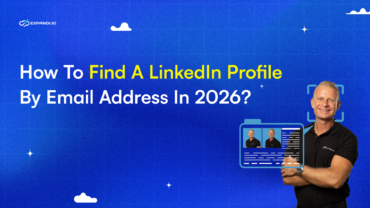How to Add a Promotion on LinkedIn & Notify Your Network (2026 Guide)
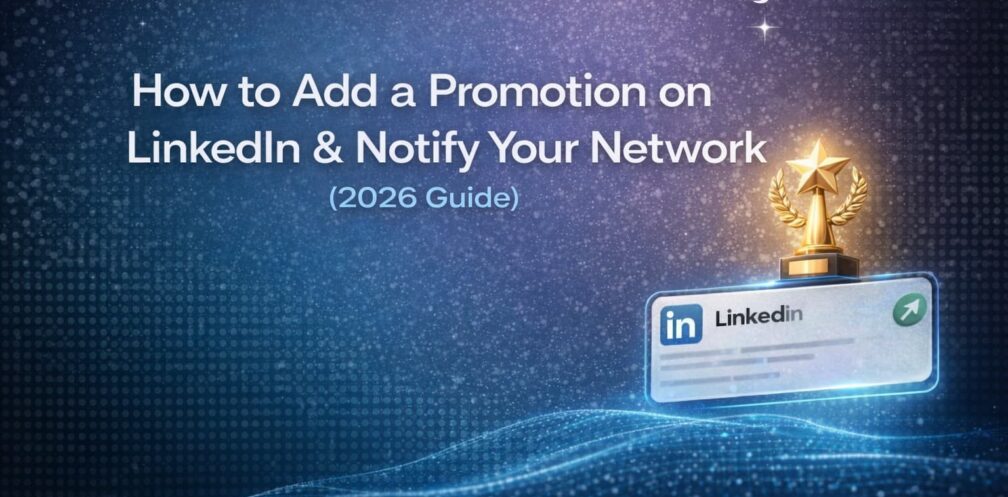
Getting promoted is a huge career milestone. And how you show it on LinkedIn matters more than most people realize.
Simply adding the promotion is straightforward.
But a promotion isn’t just a line item on your profile. Done right, it can strengthen your professional brand, signal growth to the right people, and open up new opportunities.
LinkedIn gives you several ways to reflect a promotion, and each one sends a different signal:
- Updating your role quietly inside your Experience section.
- Notifying your network about the change.
- Publishing a post to highlight the promotion publicly.
- Adjusting your headline, summary, and featured content to match your new scope.
The problem is that most people either overdo it (vague announcements, no context) or undervalue it (silent updates that miss the moment entirely).
This guide breaks down how to handle it right.
You’ll learn:
- How to add a promotion on LinkedIn: Step-by-step.
- Adding promotions on LinkedIn in 2026 (what’s new).
- When and how to add a promotion the right way.
- 5 Best practices to make the most out of adding a promotion on LinkedIn (examples).
- What to include in your LinkedIn job promotion post.
- Easy template for LinkedIn job promotion post.
- How to add a promotion on LinkedIn: FAQ.
Key Takeaways
- Adding a promotion on LinkedIn is simple, but how you structure and time it determines visibility and impact.
- Promotions should be added under the same company when scope or seniority increases, not as a new employer entry.
- In 2026, LinkedIn promotions can trigger Work Celebration posts, feed distribution, and profile highlights, even without a manual announcement.
- You can update your Experience section without notifying your network, or choose to share publicly when timing makes sense.
- High-performing promotion entries focus on outcomes, scope, and growth, not daily responsibilities.
- Clear titles, accurate dates, and concise descriptions help LinkedIn generate stronger celebration visuals by default.
- Not every promotion needs an announcement. Visibility should match seniority, responsibility, and intent.
How to Add a Promotion on LinkedIn (Within The Same Company)
Adding a promotion on LinkedIn is simple, but doing it well requires a few things to keep in mind.
Before you notify your network or publish a post, it’s important to understand how LinkedIn structures promotions within the same company and what signals each option sends. We’ll cover each in detail below.
But first, here’s the exact step-by-step process to add a promotion inside your Experience section.
1. Go to your LinkedIn profile.
2. Scroll down to your job experience section.
3. Select the position you got promoted in (probably your current job role) and click on the plus sign.

4. Then, enter the details of your new role in the window – including your new job title, position, start date, and so on.

5. Below, you can also choose to end your current position as of now or not.

6. So, if done right, your job promotion should appear under the same company listing in your profile but as a different position. So, something like this, as an example:

And if you want to notify your contacts about this promotion, simply check this option above.

Keep in mind, adding job upgrades or promotions on LinkedIn may take up to two hours to be shared with your network and updates to your education may take up to a month to be shared with your network.
When that does happen, though, your connections will get a notification like this one.
Of course, this is ideal if you want to show a promotion on LinkedIn and let everyone know about it.

So, don’t worry, your network won’t be notified immediately if you were wondering.
And editing or deleting the update after adding it may affect the LinkedIn notification generation.
But anyone who views your LinkedIn profile after updating your changes will be able to see the news as soon as you save them. Even if you haven’t chosen to notify your network about any changes.
Even if you’re not looking for extra work immediately after your promotion (which might be the case), you can still notify your contacts to:
- Boost your SSI.
- Gather engagement and connect with new people.
- Build up your LinkedIn brand and following.
Promotions on LinkedIn In 2026: What’s New
LinkedIn has expanded how Work Celebration updates appear for promotions, new roles, and anniversaries.
Since 2025, LinkedIn rolled out:
- Richer celebration visuals (larger cards, updated animation styles).
- Stronger feed distribution for celebration-triggered updates.
- Clearer prompts encouraging users to share promotions publicly.
When you add a promotion to your Experience section, LinkedIn may prompt you to create a Work Celebration post, even if you didn’t plan to announce it manually.
Here’s how the other updates work.
Richer work celebration visuals
LinkedIn has significantly upgraded the visual treatment of Work Celebration posts tied to promotions and new roles.
Celebration updates now appear as larger, more prominent cards in the feed, with updated animation styles and stronger visual framing than standard text posts. You can also add custom visuals or images for celebration-style posts.
This makes promotion-related updates stand out more naturally, even when users don’t add much copy.
Because of this, how your promotion appears inside your Experience section matters more than before. Clear job titles, accurate dates, and concise role descriptions help LinkedIn generate cleaner, more credible celebration visuals by default.
You don’t need to design anything for these posts to work, but poorly structured experience entries can result in vague or low-engagement celebration posts.
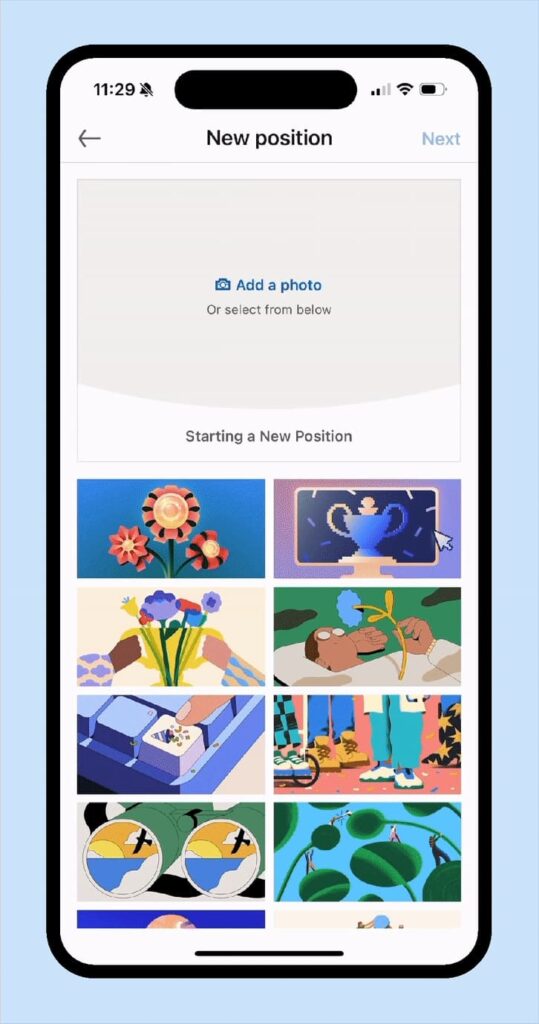
Stronger feed distribution for celebration-triggered updates
Promotion-triggered Work Celebrations often receive stronger initial feed distribution than regular profile edits or generic posts.
LinkedIn treats these updates as meaningful career milestones, which means they’re more likely to be shown to:
- First-degree connections.
- Colleagues at the same company.
- People who’ve recently interacted with your profile or content.
Naturally, people are more likely to engage with ‘good news’ posts. This is why many users notice higher-than-average engagement on promotion updates, even when the post itself is short.
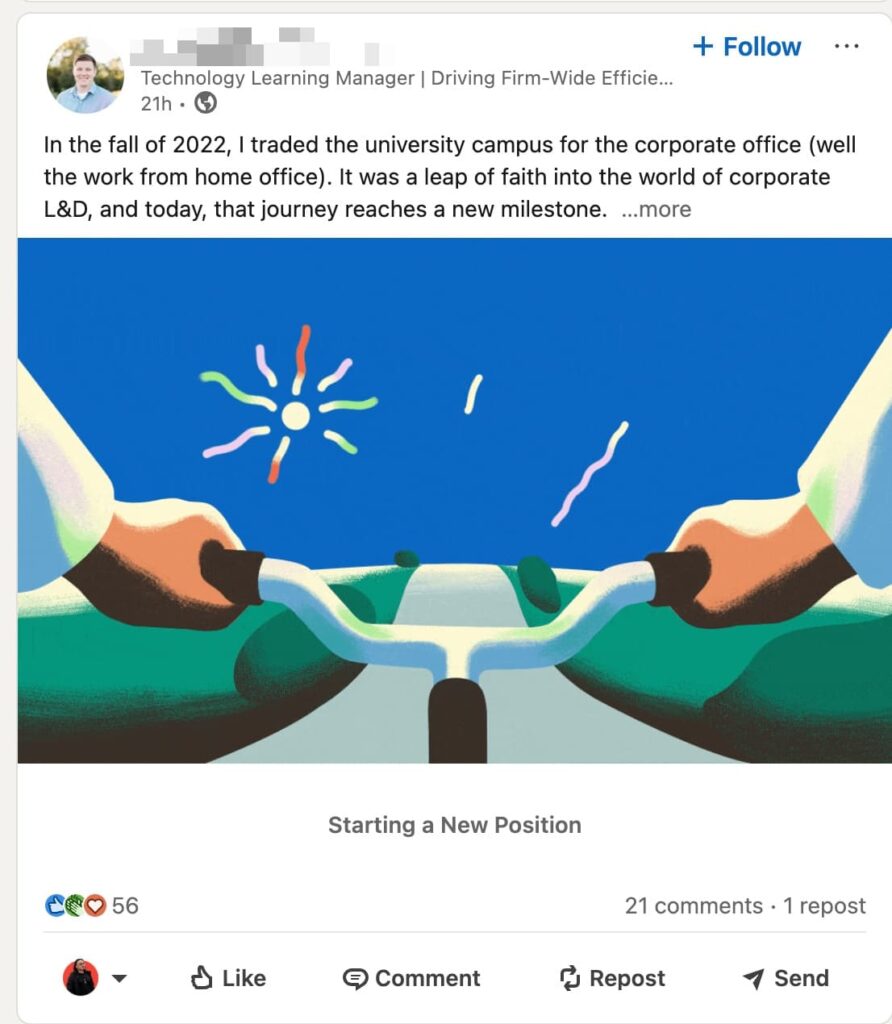
However, this also means low-effort or unclear promotions can attract attention without delivering context. If your promotion shows up in someone’s feed, they should immediately understand:
- What changed.
- Why it matters.
- What level of responsibility you now have.
Otherwise, the visibility is wasted.
Clearer prompts to share promotions publicly
After adding a promotion to your Experience section, LinkedIn now more clearly prompts users to share it as a public Work Celebration post.
This prompt often appears immediately after saving your update and can feel automatic. Even if you weren’t planning to announce anything yet.
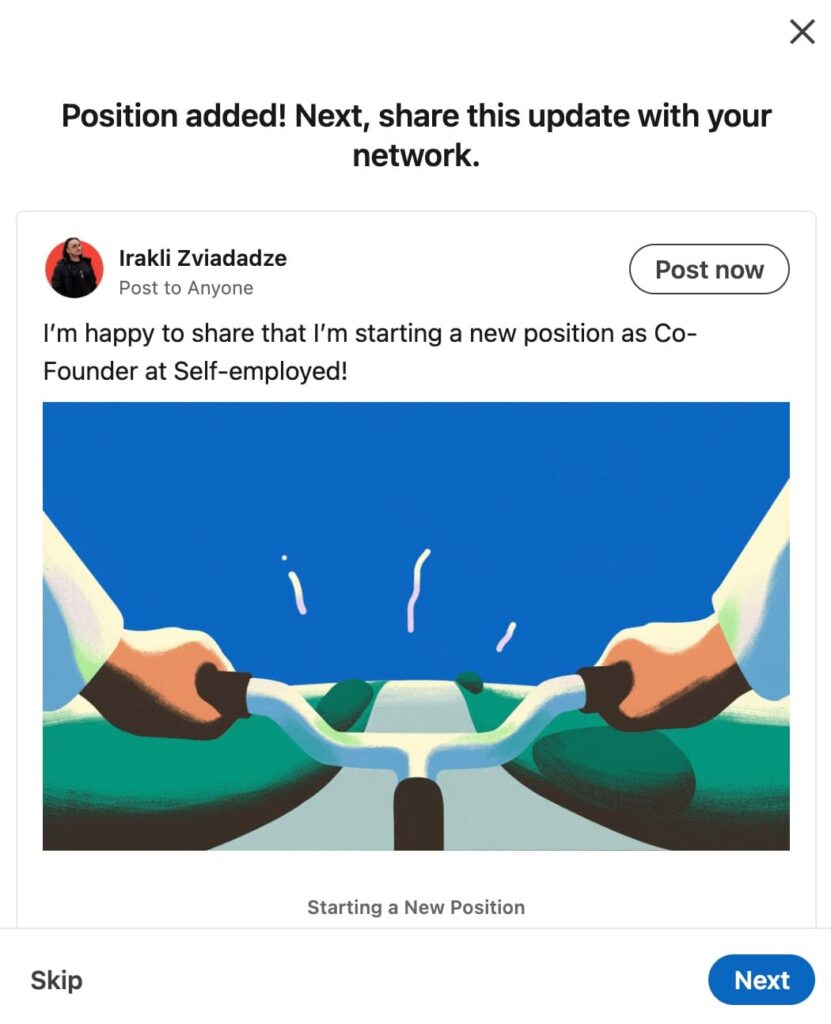
You’re not required to accept this prompt. You can:
- Share the celebration immediately.
- Edit the copy before posting.
- Or skip it entirely and keep the update profile-only.
The key thing to understand is that adding a promotion and announcing it are now closely linked actions inside LinkedIn’s flow.
That’s why timing matters. In the next section, we’ll cover when it actually makes sense to update your promotion and when it’s better to wait before notifying your network.
When And How To Add A Promotion On LinkedIn The Right Way
Updating your LinkedIn profile with a new job promotion can have a significant impact on your career prospects as well as networking opportunities.
Some benefits include:
- Improved visibility and LinkedIn SEO. Adding your work experience or a promotion within your LinkedIn profile can boost your visibility in job searches, making it easy for other people to find you.
- Better networking opportunities as you can expand your network and connect with other professionals in your industry and organization.
- Showcasing your promotion achievement and skills. Try to include results and data too, in order to show your expertise.
- Having an accurate LinkedIn profile in case new people want to connect with you.
Promotion vs new role on LinkedIn: What’s the difference and when to use each?
Not every career change should be added to LinkedIn the same way. One of the most common points of confusion is whether something counts as a promotion, a new role, or a job change.
LinkedIn treats each differently.
Here’s how to think about it. A promotion on LinkedIn usually means:
- You stayed at the same company
- Your scope, seniority, or responsibility increased.
- Your title changed (or meaningfully evolved).
Then, the role should appear nested under the same company in your Experience section
This is the most common scenario when someone moves from:
- Manager → Senior Manager.
- Individual Contributor → Team Lead.
- Specialist → Head of Function.
In this case, you should add the promotion as a new position under the same company, not as a separate company entry.
Meanwhile, a new role at the same company may look similar, but it’s different:
- You moved into a different function or department.
- The role change isn’t a clear step up in seniority.
- The work you do is substantially different.
Examples:
- Sales → Customer Success.
- Marketing → Product.
- IC → IC in a different function.
In these cases, you can still list the role under the same company, but it may not be positioned or framed as a promotion. The description and context matter more than the title alone.
A new job at a different company is a separate case entirely:
- New employer.
- New Experience entry.
- Optional announcement post (depending on timing and intent).
This should always be listed as a new company, not as a continuation.
The reason this distinction matters in 2026 is because LinkedIn now uses Experience changes to trigger Work Celebration prompts, feed distribution, and profile highlights.
If you mislabel a role:
- Your promotion may not surface correctly.
- Celebration prompts may feel misleading or premature.
- Recruiters and visitors may misinterpret your career progression.
As a rule of thumb:
- If your scope and responsibility increased at the same company, treat it as a promotion.
- If your function changed, treat it as a role change and frame it clearly.
What LinkedIn profile sections do you need to update with your promotion?
Adding your promotion on LinkedIn requires more than just ticking off a few boxes.
You need to do this right to fully show the promotion.
Typically, if you’re wondering how to update promotion on LinkedIn, you’ll want to edit the following sections:
- Experience section.
- Headline.
- About.
- Featured.
So, now that you know how to add a job promotion to your LinkedIn profile let’s look at some best practices on what you should include within your promotion listings.
You might want to read this before notifying your network straight away.
Top 5 Best Practices On How To Add A Promotion On LinkedIn (Real Examples)
Adding a promotion is easy. Making it work for your profile, visibility, and personal brand is where most people get it wrong.
The best-performing LinkedIn profiles follow a few consistent patterns when showcasing promotions. Especially now that promotions trigger feed distribution and Work Celebration prompts.
And if you decide to notify your network about your promotion (see section below on when to do it and when NOT to), there’s a chance people will engage with your post and click on your profile.
So, to be prepared, you should also have your LinkedIn profile fully optimized, especially with sections like:
- LinkedIn profile picture.
- And your summary section.
Now, here are the top 5 best practices we’ll cover below on how to show a promotion on LinkedIn in the best way.
As an overview, you’ll want to:
- Include key achievements and quantifiable results regarding your job promotion.
- Showcase any relevant soft skills.
- Skip on daily responsibilities because relevant people will already know what your responsibilities were.
- Try to include rich or interactive media where possible, ideally ones that showcase your authority or expertise.
- Consider when to notify your contacts after you show your promotion on LinkedIn.
1. Include key achievements or data and results regarding your promotion
One of the best ways to make your previous work experience work for you is to mention your key accomplishments straightaway when adding a promotion on LinkedIn.
This is what your leads are going to be interested in too.
Why were you promoted? What kind of results did you achieve for your past client or company that led to your promotion?
So, to make the most out of this, be sure to include any tangible results, achievements, data, or numbers when adding the promotion on LinkedIn.
In most cases, your leads will want to know two things:
- What you’ve accomplished in the past.
- If you can achieve similar results for them.
Keep this in mind when showcasing a promotion on LinkedIn.
Even if there’s not a single specific reason why you got promoted (maybe it was your discipline or work ethic), it’s still a good idea to mention any kind of qualifiable and tangible results in your previous positions.
Like so:

As a general format, you can’t go wrong with:
- 1-2 sentence company overview.
- Key accomplishments with results written in bullet points.
However, sometimes, you can’t show any results or didn’t work in a job position that doesn’t deal with a lot of data.
How to show a promotion on LinkedIn when that’s the case?
Here’s what you need to know.
2. Highlight your soft skills
What are soft skills?
These are attributes and habits that describe how you work individually or with other people.
Unlike hard skills, they’re somewhat harder to quantify, as most soft skills are things like teamwork, responsibility, leadership, creativity, and so on.
So, how do you show a job promotion if it’s related to your soft skills?
It’s simple.
In that case, you can focus on how you work with other people, take charge of projects, and your process when working with other people.
Storytelling also works great here. You can give a more emotional description of what your promotion was like or what you learned.
Here’s an example of a work experience position that focuses on soft skills and uses storytelling effectively.
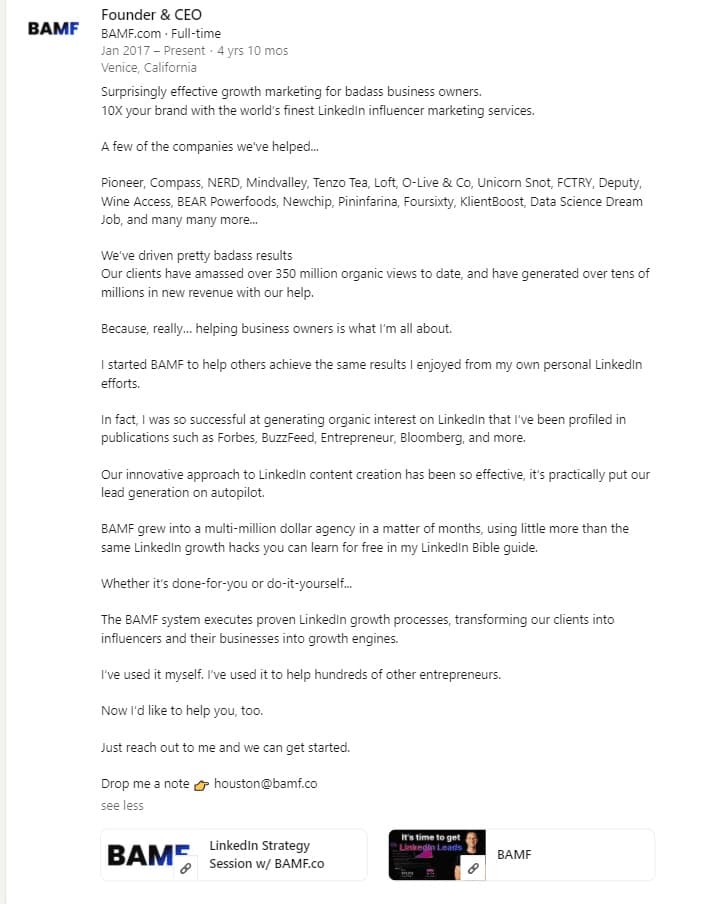
3. Don’t include daily responsibilities in your job promotion
This is one common mistake you’ll want to avoid in your promotion listing as well as the work experience section. Many people do this in their resumes as well.
When listing your previous work positions, you’d want the person reading to know what you were doing in those roles, right?
Wrong!
When listing your promotions or work experience on your resume or LinkedIn, you should always write for your target audience.
So, if the goal of your LinkedIn profile is for you to connect with marketing startup owners (let’s say they are your ideal clients), you should write for them in mind.
And chances are, the CEO of a marketing startup already knows what some of your daily responsibilities are.
So, there is no need to list out your daily responsibilities in bullet points like:
- Ran email marketing campaigns.
- Used lead generation strategies to generate new clients for Company X.
- Wrote new landing pages.
As mentioned in tip #1, you should always try to include results or data where possibles, and NOT daily responsibilities.
If that is not possible, however, you should focus on your primary responsibilities and soft skills.
4. Include rich/interactive media where possible
Rich media elements help spice up your LinkedIn profile and capture the attention of possible buyers.
So, this can be a great way to make your profile stand out or even improve how your job promotion is presented.
Essentially, this includes visual posts, links to your past work, photos of you and your colleagues, and even PowerPoint files.
Think of this as part of your personal branding.
If you want your profile to be memorable, you’ll want to be constantly creating content and networking.
And rich media helps to show off your relatable side.
Even if it’s not related to your new job promotion, you can still add some visuals to your profile to help you stand out.
Consider pictures like you giving a speech, with your colleagues or business partners, in front of a stage, and so on.
Here’s an example of what rich/interactive media looks like when showing or updating a promotion on LinkedIn.

In short, by showcasing samples of your skills and work, you add value to your profile and increase visibility.
To add media, click on the pencil icon next to a specific job listing on your profile and scroll down until you see the media section.

5. Consider when to notify your contacts after your promotion
Last but not least, let’s go over some practical use cases on when you should notify your contacts about your promotion and when you should NOT.
When you add a new promotion to your LinkedIn profile, you have the option to turn on the ‘Notify network’ option so that your contacts get a notification.
Then, they will get the option to congratulate you by liking or commenting on the post.
But aside from simply notifying your contacts about the change in your career, you should also look at the objective behind updating them.
Let’s go over some scenarios.
When to notify your contacts after updating or adding a promotion on LinkedIn
For the most part, you’ll want to update your contacts if your promotion or job change is noteworthy and says a lot about you.
For example:
- Starting your own company or agency.
- Becoming the head of your department.
- Getting promoted to a senior role.
- Taking on more serious responsibilities.
- And more.
Usually, you’ll want to have a more extensive network in these roles and know which of your contacts can help you and how.
So, if you decide to make an announcement post about this, you might gain some leads automatically. Or, at least, you’ll know people in high positions in your industry who might be able to help you out in some other way in the future.
If that’s the case, consider updating your contacts.
When to NOT notify your contacts about your promotion
On the other hand, consider that not every promotion is noteworthy.
Though, this shouldn’t diminish your achievements.
If anything, you’ll still have connections congratulating you either way.
But the point is:
You should NOT notify your contacts if you’re not following the best practices above.
Here are some promotions that are not worth announcing:
- Testing your profile changes.
- Previewing text.
- Making a vague announcement post that doesn’t say a lot about what’s new.
- And more.
What Should I Include In My Job Promotion Post On LinkedIn?
Now, before we wrap up, let’s take a look at a few more scenarios on how to show promotion on LinkedIn properly.
- If you’re updating your LinkedIn to reflect your new job changes, make sure the timing is right before posting. Wait until you have formally accepted the role and communicated changes to all parties involved.
- Keep your target audience in mind. A promotion is a great thing! But be sure to also showcase your achievements and how you’ve helped. This can also be a good lead-generation strategy.
- If you’re leaving a company, announce your departure and highlight positives from your previous location. This might include professional achievements and outcomes you’ve worked together on.
Example Post Template On How To Add A Promotion On LinkedIn
Finally, here’s a template you can use to post about your promotion on LinkedIn.
How to post a promotion on LinkedIn example template.
“Exciting news! I’m thrilled to announce my promotion to [new position] at [company name]. I’m grateful for the opportunity to continue growing within the company. After achieving [outcome or results], I want to thank my colleagues for their support on the work we did together.
Looking forward to helping [company name] reach new heights!”
How to announce starting a new job example template.
“I’m thrilled to announce I’ll be starting as [job title] at [company name].
I’m passionate about the [company’s values or commitment]. And I’m super excited to help them reach [outcome or results].
As [job title, I’ll be helping [company name] with all things [deliverables].
Looking forward to all the amazing work we’re going to be doing!”
How to Add a Promotion on LinkedIn: FAQ
Yes. When updating your Experience section, you can turn off the “Notify network” option. The promotion will still appear on your profile, but it won’t trigger a Work Celebration post or feed notification. This is useful if you want to update quietly or wait for better timing.
Profile updates usually appear immediately on your profile after saving.
If you choose to notify your network, LinkedIn may take up to a couple of hours to surface the Work Celebration update in feeds. In some cases, prompts or celebrations may appear slightly later.
Not always. If the promotion is meaningful (seniority, scope, leadership, or visibility change), a short announcement can be worth it. If it’s a minor title change or internal adjustment, keeping it profile-only is often better. The key is whether the update adds context or value to people seeing it.
A promotion is added under the same company and reflects increased responsibility or seniority.
A new role (especially at a different company) should be added as a separate Experience entry. Mislabeling this can affect how LinkedIn surfaces your update and how others interpret your career progression.
Yes, but be careful. Editing or deleting a promotion after notifying your network may affect how the update appears (or disappears) in feeds. If you’re unsure about wording or timing, it’s best to finalize the Experience entry before triggering any public notification.
Where to Go From Here
Adding a promotion on LinkedIn is easy. Using it strategically is what makes the difference.
In 2026, promotion posts can trigger:
- Feed visibility.
- Profile highlights.
- Increased attention from recruiters, peers, and potential leads
- Higher engagement than usual.
A well-handled promotion can reinforce your credibility and career narrative. While a rushed or vague one wastes visibility.
If you’re actively using LinkedIn for networking, personal branding, or lead generation, these moments matter more than ever.
And if you want to turn profile updates, celebrations, and visibility spikes into actual conversations, tools like Expandi help you follow up, engage, and build relationships at scale.
See if Expandi is right for you or claim a free, 7-day trial here.
You’ve made it all the way down here, take the final step

